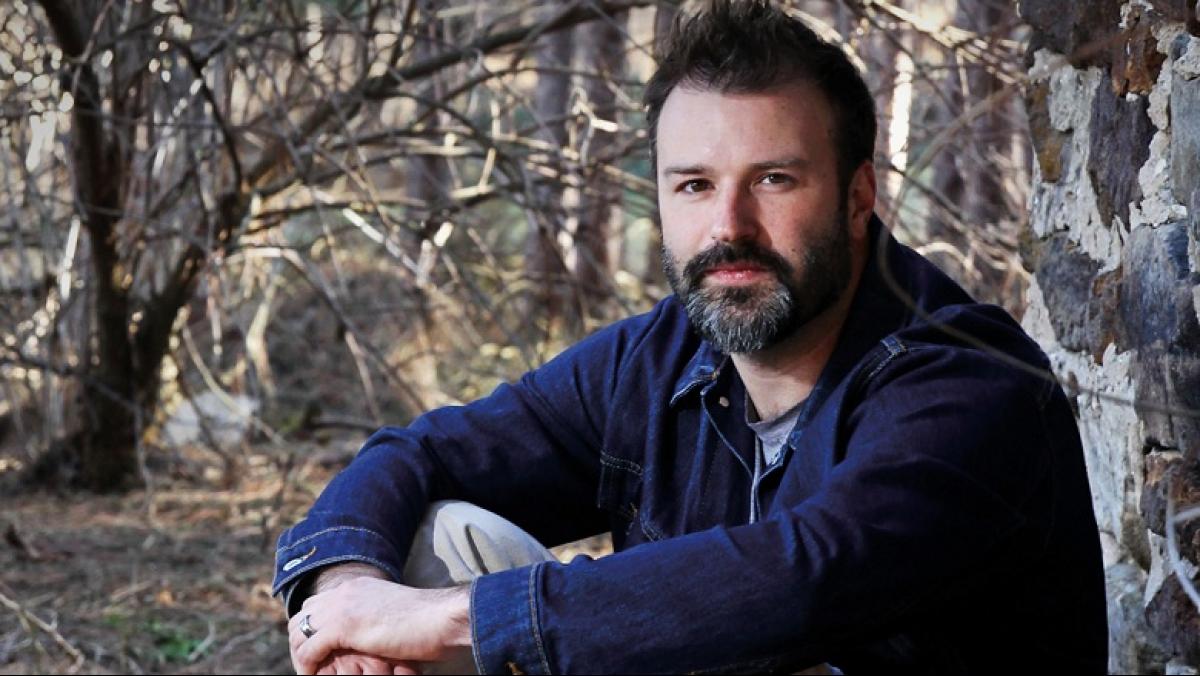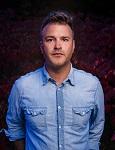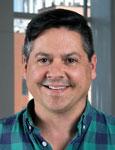Nickolas Butler was born in Allentown, Pennsylvania, and raised in Eau Claire, Wisconsin. His writings have appeared in Christian Science Monitor, Kenyon Review Online, Narrative Magazine, Ploughshares, The Progressive, and elsewhere. Butler is a graduate of the University of Wisconsin–Madison and the Iowa Writers’ Workshop.
 Released in March of 2014, Butler’s debut novel Shotgun Lovesongs is causing quite a stir in the literary world. Called “impressively original” by New York Times book critic Janet Maslin, this story of five childhood friends living in—and out of—rural Little Wing, Wisconsin, was hailed by critic Jonathan Evison as “a sure-footed and unabashedly sentimental first effort that deserves to be among the standouts in this year’s field of fiction debuts.” Independent and online reviewers are echoing these sentiments, with an appearance on the Amazon.com Top Ten list for March and at the top of IndieBound.com’s Indie Next List bringing even more attention to Butler’s “unmistakenly American” novel.
Released in March of 2014, Butler’s debut novel Shotgun Lovesongs is causing quite a stir in the literary world. Called “impressively original” by New York Times book critic Janet Maslin, this story of five childhood friends living in—and out of—rural Little Wing, Wisconsin, was hailed by critic Jonathan Evison as “a sure-footed and unabashedly sentimental first effort that deserves to be among the standouts in this year’s field of fiction debuts.” Independent and online reviewers are echoing these sentiments, with an appearance on the Amazon.com Top Ten list for March and at the top of IndieBound.com’s Indie Next List bringing even more attention to Butler’s “unmistakenly American” novel.
I recently traveled to Butler’s home near Eau Claire, where he lives with his wife and their two children, to discuss his new novel, his Wisconsin roots, and his plans for the future.

JS: First off, in the interest of full disclosure, I have to tell our readers that you used to work for the Wisconsin Academy. So, your success as an author can be traced back to us, right?
NB: [Laughter] I had and still have a great affinity for the organization and in particular this magazine. I actually used to read it, either at my school library or the public library when I was a teenager, and I think I entered the fiction contests when I was in my early twenties.
JS: Readers in America—and other countries, too—are gobbling up your new “big-hearted” novel, Shotgun Lovesongs. What is it about rural Midwestern life as portrayed in your book that so many people find compelling?
NB: If you are a writer from the Midwest it seems like your work is always—almost automatically—characterized as sentimental. Which is unfair.
I think Shotgun Lovesongs is sentimental at times, but I don’t think that it is sentimental in the pejorative sense. I’d like to think it is more of a clear-eyed interpretation of contemporary life in rural Wisconsin, reflecting real choices and sacrifices that people make, than a sad-sweet tale about how friendships change.
Two of the main characters leave Little Wing, for example, and I think that’s a positive thing for them, and probably a reflection of the fact that they no longer “fit” into small-town America.
I also wanted to show readers that the face of small town Wisconsin is definitely changing. The work done on bigger farms today isn’t necessarily being performed by old, noble Norwegian farmers. More and more, farms are operated by hard-working immigrants from Mexico and Central America.
It’s interesting to me to see how people across the U.S. receive the book. I guess I’d like to think that the book resonates with people in Wisconsin and beyond. Though, it means a lot to me that the book is received well here in Wisconsin, in particular.

JS: Do you feel like you have a responsibility to be the voice of small-town Wisconsin?
NB: Not at all. No, plenty of great writers—David Rhodes and Michael Perry come to mind—have been voicing the culture and concerns of Wisconsin and the rural Midwest long before I stumbled onto the scene. Also: Jane Smiley, Garrison Keillor, William Maxwell, Jane Hamilton.
JS: Those are great writers. As a first-time writer, how did you navigate that vast unknown into which your book was being released?
NB: Well, during the prepublication phase of Shotgun Lovesongs, the plan was that I would travel a loop around Wisconsin and the upper Midwest and down to the Ohio River Valley on something called the Nickolas Butler Heartland Walking Tour to promote the book.
I actually did do a lot of driving, but I also flew here and there and then drove out to small, independent bookstores with a stack of four or five books in my hands. I would often arrive to a greeting of, Now, who are you? People were gracious, but, because this is my first book, no one knew who I was.
Then a lot of Midwest independent booksellers got behind the book because they took the time to read the copies I gave them. I really owe them a lot of gratitude for getting out the word—I can only assume they talked about the book because they liked it.
JS: Well, there is so much of Little Wing that I—born and raised in rural Wisconsin—find familiar: the abandoned mill, drinking at the VFW hall, long nights by the bonfire. Is this book in some ways a love song to Wisconsin?
NB: Yes, I suppose it is. I wanted to write about Wisconsin—I wanted to show people why I’m so proud to be a part of this state. So, yeah, it’s a love song.
A lot of people ask me at readings, Hey, is the mill in your book the mill from Fall Creek? and other questions about the novel’s setting because it is so recognizable to someone who grew up in Wisconsin.
For instance, my best friend Josh Swan for a number of years had a boat shop in an old mill in Mount Horeb that was eventually taken down to make room for office space. I would go to visit Josh to watch him work, we’d hang out, talk, then go to the Grumpy Troll for a drink afterward.
And I guess I never realized how much of that space I remembered. As I was thinking about this story, I already knew what the mill smelled like, how the light came in only through certain windows at certain times of the day.
Years later, driving all the time to Iowa for my writing workshop, I realized how many towns have these old mills. So, I wrote a mill into the first chapter, but I wasn’t thinking about a larger book beyond that chapter.
I wrote the end of the book later on, but I didn’t have anything to bridge the beginning and the end. It was my agent who suggested the mill should be a character in the book, a way to bridge that gap. “Why do they keep going to the top of the mill?” he kept asking, almost pushing that point. So I made it a central part of the book.
JS: The parallels between Leland (Lee) Sutton and Justin Vernon, Bon Iver frontman and Grammy Award winner, are clear, but Shotgun Lovesongs isn’t really a book based on his life, right?
NB: You have to understand that in this community there wasn’t really a template for artistic success and fame on the scale of Bon Iver. Justin gave a lot of us this sense of confidence that we could go out and do something different.
So the character Leland is inspired by him, but he’s obviously not based on him. Justin has never been shot in the leg, and I don’t think he’s even ever been married. One thing that sets Justin apart from so many other people is that he went away, gained success, and then came home. He’s really involved in the Eau Claire community.
JS: So, you drew inspiration from Justin, with whom you went to high school, but this book is based more on your life and experiences.
NB: Yes, I mean, Lee’s journey came from the fact that I really never had a good job. My wife and I got pregnant with our first son, and she was accepted into law school when I was working the counter at Star Liquor on Willy Street [in Madison] making eight bucks an hour, and we were on state assistance. I had applied to grad school once and got rejected.
Lee’s whole experience is in some ways my experience of writing this book. I wanted to provide for my family, and I wanted my child to be proud of me. I don’t have a lot of skills, and I thought, Hell, I’m just an English major. I love books and I can’t do much beyond reading and roasting coffee and recommending a good beer.
So, my life became about becoming a better writer. I took a workshop with Dean Bakopoulos, and kept working on my short fiction, which in turn got me into the Writing Program at Iowa. More short stories led to publication in some big journals. I started building momentum, building my own momentum. And, that’s what Lee’s story is about. I think that if you are just dogged about it, like Lee, you can—well, you need to improve yourself, too. That hard work, the learning and refining, is the unsexy part of it all. I think that’s what it takes to be an exceptional writer, or, in Lee’s case, an exceptional musician.
Except that musicians are sexier than writers.

JS: Beyond Bon Iver, there is a lot of great art and culture coming out of the Eau Claire region right now. Do you feel like you are a part of the Eau Claire zeitgeist?
NB: Well, I live in the unincorporated township of Cleghorn, which is about ten miles south of Eau Claire. So, I don’t know if I am part of the zeitgeist. I don’t know. Maybe someday I’ll be part of that zeitgeist. Right now I sort of feel like a carpetbagger.
For me, a lot of coming back to the Eau Claire area is about family. We have four grandparents living within fifteen miles of our house. I have humble desires for the way I want to live my life. Living in St. Paul, simple things like feeding birds, watching the stars, just weren’t possible.
I hope for the sake of Eau Claire and smaller communities around the Midwest that people are “coming back.”
Eau Claire is definitely investing heavily in its downtown and much of the grassroots excitement is coming from younger entrepreneurs who seem determined to succeed, which is great. One attractive thing about places like Eau Claire is that you can try—and perhaps fail and try again—at a fairly cheap cost. There’s so much opportunity here.
JS: I’ve heard you mention that you greatly admire place-based novels like Ken Kesey’s Sometimes a Great Notion. What role does home—the physical place as well as the feelings associated with the concept—play in your book?
NB: When I was an undergraduate at UW–Madison, I took a course with Bill Cronon, the revered environmental history professor. He urged us to write about place, and that was something that has always stuck with me. So, yes, Sometimes a Great Notion is probably my favorite novel, partly because the setting of the book is so well written, and partly because the setting shapes the characters, challenges them, even defies them. I feel likewise about Annie Proulx’s The Shipping News, Poachers by Tom Franklin, and really anything by Rick Bass—just to name a few.
In terms of home … I suppose I was interested in coming home. I was interested in trying to create my own place, a place to grow my family, a place with connections to family and a community that I knew. Of course, home is a fertile ground for writers: family dramas, memories, rivalries, money, love—every emotion in the human spectrum is easily accessed when you return home, and the perspectives on home are so deep, so knowing.
JS: Where did you come up with the name Little Wing, by the way?
NB: I really struggled to come up with a name for the fictitious town in the book, but I was definitely looking at maps of Wisconsin, in particular at little towns close to the Mississippi. Then I remembered that Stevie Ray Vaughan cover of the Jimi Hendrix song “Little Wing,” which seemed perfect because the town was small. But it also worked as an homage to Vaughan, who died in a helicopter crash in Wisconsin.
JS: I read online that Fox Searchlight bought the film rights to Shotgun Lovesongs. Any trepidation in seeing your characters appear on the big screen?
NB: In my mind, the film and book are two totally different pieces of art. And because I have so little control over what happens in the film, I’ve also released myself from any kind of trepidation. Contractually, there’s just not that much that I can do, so it’s not worth worrying about. That being said, I’d love to see Dean Bakopoulos’ novel Please Don’t Come Back from the Moon on the silver screen. Or maybe Michael Perry’s Population: 485.
JS: Other than resuming your Heartland Walking Tour, what’s next for Nickolas Butler?
NB: I have a collection of short stories, The Chainsaw Soirée, that will be published in the summer of 2015 by Thomas Dunne/St. Martin’s Press, and a collection of poetry, Light Travels Faster Downhill, that will be published by Typecast Publishing in late 2014 or early 2015. After that … I don’t know. I’m working on a new novel, a new collection of short stories, and a collection of plays— all of which are presently totally embryonic. We’ll see. I’m dabbling.





